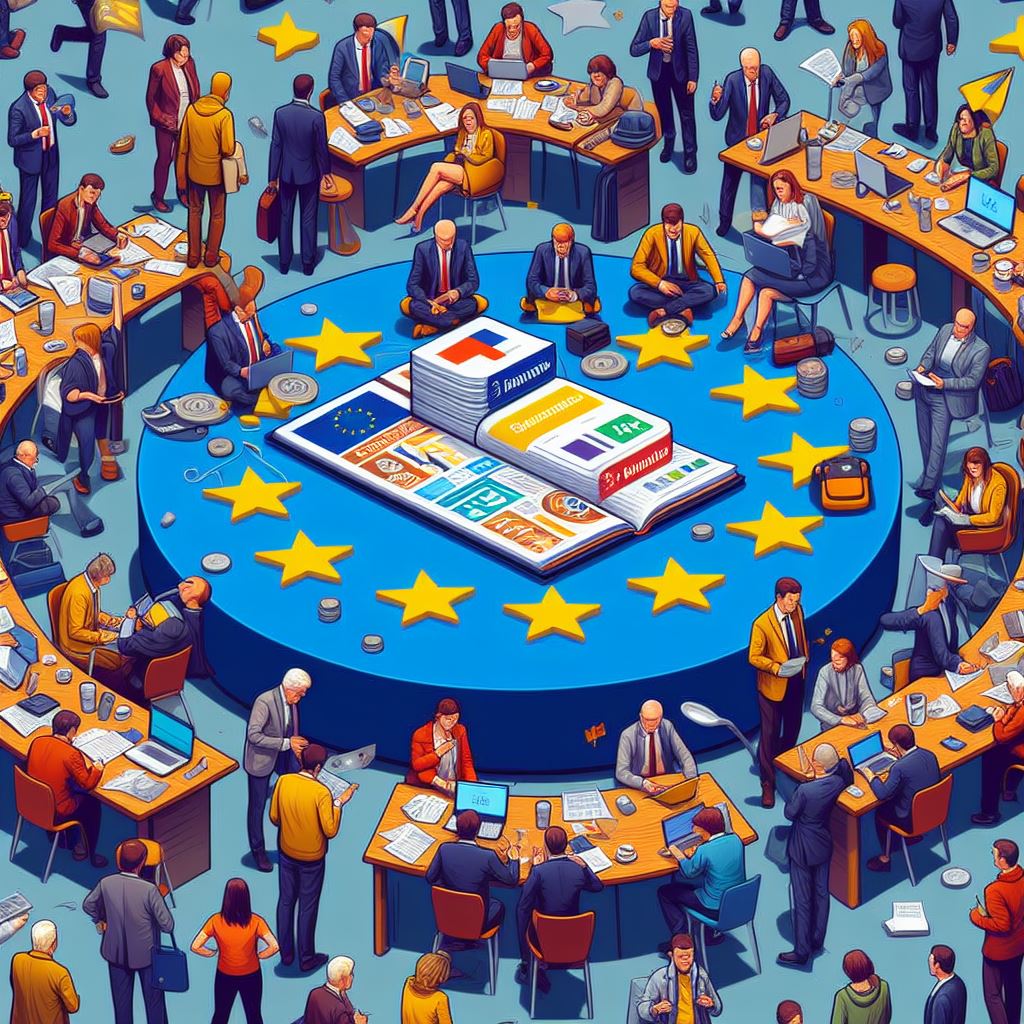From the now-old GDPR (the European privacy regulation) to the very recent Digital Markets Act and Digital Services Act (which seek to put a limit on the excessive power of certain technological giants), passing through the AI Act, which has the ambition of promoting the responsible use of artificial intelligence. In recent years, the European Union has turned into the digital world’s mastiff, trying through its laws – not without contradictions and with an effectiveness that has yet to be verified – to curb the excessive power of large digital platforms. For these reasons, one would have expected digital policies to play a leading (or at least second) role in the European elections.
European People’s Party
The position of the European People’s Party (EPP) on digital matters was more articulate in the Position Paper on Digital Policy adopted at the political assembly of February 2022. A document that is therefore no longer very new, but which to date still represents the most extensive we have available to interpret the position of the main European group – centre-right of a Catholic matrix, of which Forza Italia is a member in Italy – on the subject of new technologies.
One of the most important aspects highlighted in this document is the need for Europe to introduce new regulations and “create an enabling and coherent environment for our companies to prosper and grow in the digital economy. Digital policies should, therefore, always be discussed to strengthen, harmonize and completing the Digital Single Market (DSM)”.
On the topic of artificial intelligence, the EPP confirms the importance of the AI Act but warns against over-regulation: “We believe that certain AI applications present potential risks to fundamental rights and security, and therefore their development, market access and implementation should be carefully monitored to ensure compliance with European values and standards. Limits to the use of AI applications that put vulnerable groups at risk are necessary. At the same time, we warn against over-regulation, as (…) this could hinder the growth of the EU industry, discourage investments in AI startups or delay or disincentivize innovations in the EU market.”
Between the USA and China
Another issue of fundamental importance is the historical difficulty of European technology companies to compete with the giants of the United States and China. From this point of view, the European People’s Party points out: “Our European technology companies still struggle to grow and expand. In the field of artificial intelligence, the EU is home to only 5% of the unicorns (fast-growing companies with a market value of EUR 1 billion or more) in the world. Only 22% of our small businesses use two or more AI technologies, and only 12% and 21% of our SMEs use (respectively) big data analytics and advanced cloud computing services. Therefore, the EPP supports the Commission’s 2030 goals to ensure that 75% of European companies use cloud computing, big data and AI services.”

Socialists & Democrats
The goal of the leading European left-wing group on digital issues is made explicit right from the title of the chapter devoted to this topic: Our Digital and Inclusive Europe. It is worth noting an interesting aspect of the European digital agenda, namely the short poll placed at the top and addressed to the voters, who are asked to express which priority they consider to be among the regulation of AI, internet access for all, the protection of platform workers (to understand, riders, Uber drivers, etc.), and the protection of online consumers. Now, the need to regulate AI has won the most votes (57%), while the protection of platform workers is in last place (only 7%).
Let us come to the point: about artificial intelligence, the program states: “We must be vigilant on the subject of AI (…). No one should be forced to sacrifice their fundamental rights for the sake of technological progress. That is why we must demand that high-risk AI be thoroughly vetted for bias and discrimination, and if it poses a risk to our rights, it must be banned. Human oversight and transparency requirements should always be in place to ensure that artificial intelligence is used ethically and responsibly”. All elements that, it must be said, we can often find in the AI Act.
Other issues highlighted in the program include digital education in schools, gender equality in STEM disciplines (science, technology, engineering, mathematics) and digital taxation, which directly targets big tech: “Digital giants, including Google, Apple, Meta and Amazon, should not be allowed to exploit tax laws by concentrating their profits in a few low-tax jurisdictions. We need to take action to ensure that these tech giants pay their fair share and contribute to a fairer and more equitable society”.
Renew
The liberal group has very recently published a paper entitled Ensuring the Openness of the Global Internet. It is a very technical paper that is interesting to analyze from a geopolitical point of view. Consistent with his liberal stance, Renew’s priority seems to be to counter the growing ‘balkanization of the internet’, i.e. the tendency to fragment the global network into a series of small internet that refer to the geopolitical areas they belong to (the possible banning of TikTok in the United States is the latest example of this trend, as is the blocking of many US platforms in Russia).
Even in the absence of a proper section dedicated to digital policies, one can deduct from Renew’s website the attention this group pays to the creation of the digital euro (the European electronic currency issued by the ECB, which is still being studied) and the need to regulate cryptocurrencies further. Regarding artificial intelligence, Renew emphasizes the achievements of the AI Act and, even more so, the importance of preventing big tech from gaining a monopoly in this area: “With the recent agreement on the Artificial Intelligence Act, the Union has become the first continent to regulate and guarantee ethical AI with adequate safeguards to prevent abuse of this technology. However, little attention has been paid to the threat of monopoly, with a clear trend towards market concentration”.
The Greens
The European Greens consistently pay particular attention to the environmental impact of new technologies. An issue that is as important as it is often underestimated. In the section dedicated to this theme, entitled Green our Tech, we read: “We all love technology. That’s why, when our favourite phone or device breaks, we don’t want to be forced to throw it away and have to spend a lot of money on a new one. We want to be able to repair it, replace the broken parts, maybe even recycle it into something new”. Between the circular economy, the right to repair and the need to limit the technology sector’s emissions, the Greens’ digital priorities are clear and consistent with the environmentalist approach. What is perhaps lacking is an overview of the other aspects of the technology world.
European Conservatives and Reformists
In the manifesto launched last April, there are some ideas – although predictably secondary to the fight against immigration and the need to ‘revise the Green Deal’ – related to the digital world. “We want to empower small and medium-sized enterprises (SMEs) by cutting unnecessary red tape, calling for a temporary halt to new EU regulations for small businesses, instead directing resources towards the implementation and enforcement of existing legislation, and modernizing the EU’s digital landscape to promote innovation and investment in cutting-edge technologies such as AI, 5G/6G and quantum computers,” the manifesto reads.
Identity and Democracy
Inside, there is only one very brief reference to digital policies, in which the ‘need to protect freedom of expression, in particular digital freedom of expression’ is mentioned. For the time being, the League (and not only among the Italian parties) has not published its program for the European elections.
The Left
In its manifesto published in the run-up to the European elections, it says on digital matters: ‘We welcome the European Parliament’s attempt to regulate the use of artificial intelligence and support the ban on biometric surveillance, emotion recognition and predictive policing by AI systems. However, the European Parliament’s rule focuses on market-based regulation and thus neglects the essential aspect: the need for transparency and accountability (democratic and social control) of technological innovation with regard to its social and environmental impacts.”
The proposals of the Left concern a regulation of AI that provides for the need for human control, attention to the impact of this technology on the world of work and the elimination of all forms of algorithmic discrimination, a ban on the use of artificial intelligence in warfare, the controlled introduction of digital technology in education, so that it respects and improves the work of teachers and avoids exacerbating social inequalities, and attention to the people with disabilities, the older people and all those who risk being excluded from the current, very rapid digital transition.



